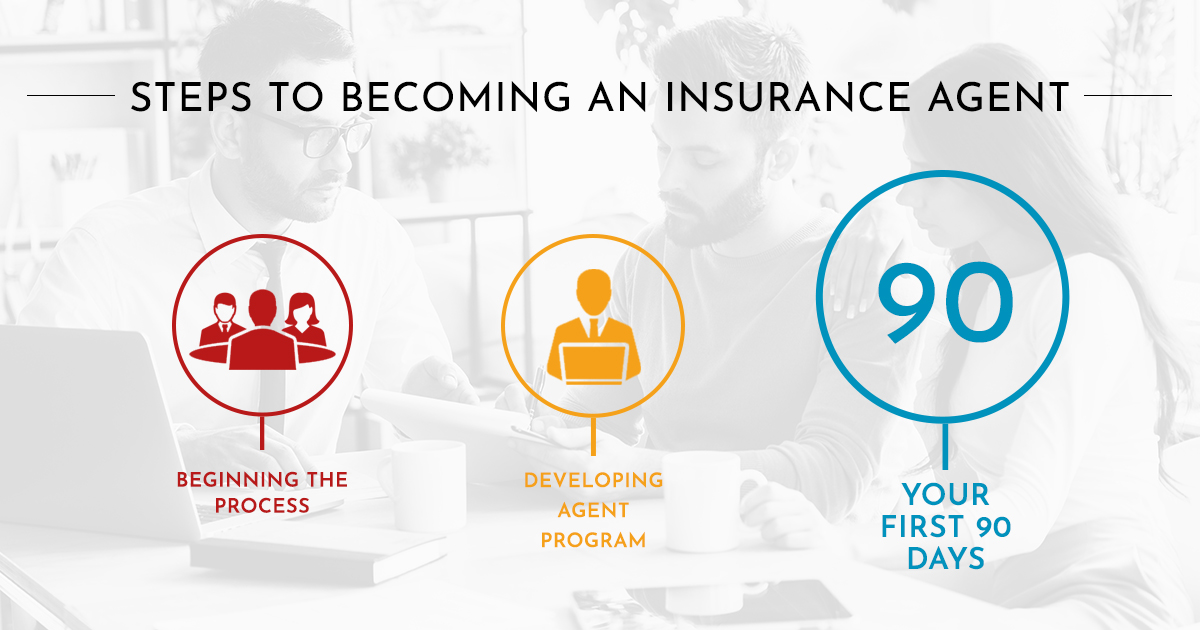To get started as an insurance agent, first research the types of insurance you want to sell & choose a niche that interests you. Enroll in a pre-licensing course to gain necessary knowledge, & then pass your state’s licensing exam. Once licensed, consider joining an established agency for mentorship & training, or explore becoming an independent agent. Build a strong network, focus on customer service, & continuously educate yourself about industry trends to succeed. Effective marketing & relationship-building are key to growing your client base.
how to get started as an insurance agent. Ready to jump into the world of insurance? Discover simple steps on how to get started as an insurance agent & begin your new career today!

Understanding Insurance Industry Basics
Entering a new career often requires a solid understanding of that field. For aspiring agents, grasping fundamental concepts within insurance industry provides essential groundwork. Familiarity with various products life, health, property, & casualty sets a strong foundation for success. Each product type possesses unique attributes, catering to different market needs.
And another thing, comprehending regulatory environments surrounding insurance helps prevent potential pitfalls. Licensing, compliance, & code regulations may vary across regions, emphasizing importance of obtaining accurate information. Knowledge of companies’ underwriting practices & claim processes enriches an agent’s ability to serve clients effectively. Clients expect professionalism & transparency; consequently, developing credible authority hinges upon a robust understanding of these principles.
Lastly, recognizing trends affecting insurance markets such as technological advancements & economic fluctuations enables agents to adapt strategies accordingly. For instance, understanding how digital tools influence client interactions can enhance engagement. Thus, foundational knowledge regarding industry operations proves invaluable for any aspiring insurance agent.
Licensing Requirements
Every aspiring insurance agent must navigate intricate licensing requirements. Each state sets forth specific regulations regarding qualifications & examinations, impacting agents’ ability to operate legally. First step involves researching state-specific prerequisites, ensuring candidates meet minimum age & residency standards, along with educational qualifications. Generally, completing a pre-licensing course forms a necessary foundation.
Next, passing state examinations proves crucial. These assessments gauge understanding of relevant laws, product offerings, & ethical considerations within insurance. Successfully navigating this hurdle allows candidates eligibility for licensure application. On top of that, maintaining good standing after obtaining a license involves completing continuing education units periodically.
A vital aspect includes understanding potential agents’ multiple license types available. Agents may specialize in life insurance, health insurance, property insurance, or casualty insurance, requiring distinct licenses. Understanding different licenses available prepares candidates for specialization, aligning with career aspirations.
Steps for Obtaining a License
- Research state licensing requirements.
- Complete a pre-licensing education course.
- Schedule & pass relevant examinations.
- Submit application for licensure with appropriate fees.
- Complete required continuing education post-licensure.
Choosing a Specialty
After navigating licensing, aspiring agents must determine a specific specialty area. Each insurance niche presents unique challenges & opportunities. Some common specialties include life insurance, health insurance, auto insurance, & property insurance. Selecting a specialty aligns agents with their strengths & interests, ultimately enhancing job satisfaction.
Life insurance, for instance, requires strong interpersonal skills, as agents engage directly with clients about their financial plans & family protection. Health insurance, on other hand, necessitates a comprehensive understanding of healthcare policies, regulations, & market fluctuations. Similarly, auto & property insurance demand knowledge about risk assessment & home or vehicle valuation.
Exploring personal interests, market demands, & profit potential help agents decide which area conveys most appeal. And don’t forget, choosing a specialty might involve seeking mentorship from established professionals within that niche. Such connections often cultivate valuable insights, ultimately shaping novice agents’ career trajectories.
Specialty Areas to Explore
- Life Insurance
- Health Insurance
- Auto Insurance
- Property Insurance
- Commercial Insurance
Developing Sales Skills
Sales skills form a cornerstone for success in an insurance career. Possessing product knowledge alone does not guarantee success; strong communication & persuasion skills often differentiate top performers. Many agents benefit from formal sales training programs, allowing them to develop effective selling techniques geared towards insurance products.
And don’t forget, practicing active listening aids agents in understanding clients’ needs. By asking appropriate questions & genuinely engaging during conversations, agents can provide tailored solutions. Building rapport with clients fosters long-lasting relationships, which ultimately leads to referrals & repeat business.
On top of that, implementing technology solutions such as Customer Relationship Management (CRM) systems enhances agents’ ability to manage prospects & clients effectively. Such tools assist in tracking leads, scheduling follow-ups, & maintaining client relationships, thereby increasing gradual sales success.
Key Sales Techniques
- Active Listening
- Building Rapport
- Effective Questioning
- Utilizing Technology Tools
- Tailoring Solutions
Creating a Business Plan
Developing a robust business plan stands as essential step in establishing a long-lasting insurance career. A well-structured plan outlines specific goals, target clientele, & marketing strategies. Identifying market segments & understanding client needs enable agents to tailor their offerings effectively, ensuring a competitive edge.
And another thing, financial projections play a critical role in overall planning process. Establishing a budget factoring in initial start-up costs, ongoing expenses, & commission structures provides financial clarity. Understanding potential earnings helps agents maintain alignment with both short-term & long-term objectives.
Lastly, business growth strategies should outline ways for agents to expand reach. Networking within local communities, attending industry conferences, & utilizing social media platforms can enhance exposure. Agents can also consider forming partnerships with other local businesses, establishing mutually beneficial relationships that drive referrals.
Elements of a Business Plan
- Goals & Objectives
- Target Market Analysis
- Marketing Strategies
- Financial Projections
- Growth Strategies
Networking & Building Relationships
Networking forms integral component of business development within insurance careers. Establishing connections with other professionals such as mortgage brokers, financial planners, & real estate agents leads to invaluable referrals. Engaging within local business communities can elevate visibility & build reputation.
Joining industry organizations & attending professional events fosters relationship building among peers. And another thing, utilizing social media platforms such as LinkedIn creates opportunities for agents to connect with potential clients & industry influencers. Regular engagement through these channels solidifies presence in a competitive marketplace.
Ultimately, maintaining relationships post-engagement enhances trust & encourages collaboration. Follow-up communications or providing value-added resources positions agents as credible sources within their networks. Such efforts cultivate an ecosystem of mutual support, benefiting both agents & their connections.
Strategies for Effective Networking
- Join Industry Organizations
- Attend Networking Events
- Utilize Social Media
- Provide Value-Added Resources
- Establish Follow-Up Communications
Marketing Yourself & Your Services
Developing an effective marketing strategy remains critical for attracting clients within insurance. Personal branding plays significant role in differentiating an agent from competitors. Crafting a professional image through online profiles, business cards, & marketing materials positions agents as trustworthy sources within niche markets.
Content marketing provides an additional avenue for establishing credibility. Producing informative articles, videos, or podcasts showcasing industry expertise helps agents connect with potential clients on various platforms. By addressing common questions or concerns, agents can build rapport with audiences, ultimately converting them into clients.
Further, collaborating with local businesses can enhance visibility. Establishing sponsorships or co-hosting events fosters goodwill & extends outreach. And another thing, leveraging testimonials from satisfied clients can reinforce agents’ credibility, serving as powerful marketing tools. Listening carefully to clients’ needs reflects an agent’s genuine commitment, strengthening long-term relationships.
Marketing Techniques to Implement
- Personal Branding
- Content Marketing
- Local Collaborations
- Client Testimonials
- Social Media Marketing
Continuous Learning & Professional Development
Pursuing continuous learning greatly enhances an agent’s prospects. Engaging in professional development opportunities such as workshops, conferences, & online courses boosts knowledge while fostering personal growth. Adapting to shifts occurring within industry keeps agents competitive & relevant.
On top of that, obtaining advanced designations such as Chartered Life Underwriter (CLU) or Certified Financial Planner (CFP) not only strengthens expertise but also elevates an agent’s credibility. Networks formed through these programs often provide mentorship opportunities & collaborative ventures, assisting agents along their career trajectories.
Finally, regularly seeking feedback from peers & clients shapes ongoing professional growth. Constructive criticism reveals areas for improvement, encouraging agents to continuously enhance both skills & service offerings. Committing to lifelong learning enhances career fulfillment while fostering sustainable success.
Professional Development Activities
- Workshops & Webinars
- Networking Events
- Advanced Designation Programs
- Regular Feedback Sessions
- Online Courses
Utilizing Technology in Your Practice
In today’s digital age, leveraging technology often enhances overall efficiency & effectiveness in insurance practices. Numerous tools assist agents in managing daily tasks, automating processes, & engaging clients. Utilizing Customer Relationship Management (CRM) software streamlines communications while tracking client interactions, ensuring no opportunity falls through cracks.
And another thing, embracing digital marketing tools such as email campaigns, social media management platforms, & website development allows agents to establish vital online presence. Engaging clients through multiple channels creates diverse touchpoints, ultimately enhancing engagement & retention rates.
On top of that, adopting video conferencing tools enables agents to connect with clients remotely. Particularly in current environments, maintaining personal connections through virtual meetings reflects agents’ adaptability & commitment. Remaining informed about technology trends within the industry further helps agents remain competitive by maximizing efficiency.
Technologies to Consider
- Customer Relationship Management (CRM) Software
- Email Marketing Tools
- Social Media Management Platforms
- Website Development Tools
- Video Conferencing Software
My Personal Experience
Embarking on journey as an insurance agent proved both challenging & rewarding. Initially, I immersed myself in understanding various products & licensing requirements. After passing my state exam, I faced decision regarding specialization. I gravitated towards life insurance, aligning with my passion for helping others secure financial futures.
Building my network early on enabled gradual growth, while marketing efforts slowly produced tangible results. Continuous learning reinforced my commitment to developing skills & expertise. Utilizing technology not only enhances efficiency, but also improves client engagement. Ultimately, perseverance, adaptability, & passion shaped trajectory of my insurance career.
Important Tables to Consider
| Specialty Type | Required License | Common Skills Needed |
|---|---|---|
| Life Insurance | Life Insurance License | Interpersonal Skills, Financial Planning |
| Health Insurance | Health Insurance License | Knowledge of Healthcare Policies, Communication |
| Auto Insurance | Property & Casualty License | Risk Assessment, Negotiation |
| Marketing Technique | Benefits | Potential Challenges |
|---|---|---|
| Content Marketing | Builds Authority, Engages Audience | Requires Consistency |
| Social Media Marketing | Wider Reach, Instant Engagement | Managing Negative Feedback |
| Email Campaigns | Direct Communication, Cost Effective | Risk of Being Marked Spam |
“Dedication & continuous improvement lead toward success in insurance careers.”
| Networking Strategy | Advantages | Possible Limitations |
|---|---|---|
| Joining Industry Organizations | Access to Resources, Networking Opportunities | Membership Fees |
| Attending Professional Events | Face-to-Face Connections | Travel Expenses |
| Utilizing Social Media Platforms | Wider Audience Reach, Cost Efficiency | Time Required for Engagement |
Ready to jump into the world of insurance? Discover simple steps on how to get started as an insurance agent & begin your new career today!

Conclusion
Becoming an insurance agent can be an exciting journey. Start by understanding the basics of insurance & then look into getting your required licenses. Don’t hesitate to reach out to experienced agents; they can offer valuable insights. Networking is key, so attend industry events & join community groups. Lastly, remember that success takes time & dedication. With passion & persistence, you can build a rewarding career as an insurance agent. Embrace the learning process, & you’ll see your efforts pay off. Get started today & take charge of your future in the insurance industry!



